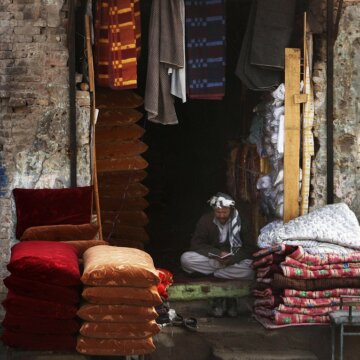- About
- Topics
- Picks
- Audio
- Story
- In-Depth
- Opinion
- News
- Donate
- Signup for our newsletterOur Editors' Best Picks.Send
Read, Debate: Engage.
| topic: | Transparency and Corruption |
|---|---|
| located: | Afghanistan |
| editor: | Shadi Khan Saif |
Under an ambitious plan, the government machinery in Afghanistan’s major urban centres has been mobilised to streamline revenue collection.
With the slogan of ‘urban discipline’, the municipalities in places like the capital Kabul and other big cities are knocking down all irregular roadside encroachments and forcing defaulters, mainly small scale vendors, to pay longstanding dues.
Alongside this, the Afghan government has also relaxed terms for registration of imported cars, which is also likely to add to the government’s kitty in the short-term.
These moves, together with the promised flow of foreign aid to the vulnerable segments of the Afghan society, might bring some respite to the war-ravaged country momentarily.
However, as the country braces for a new era of limited or no foreign aid in the backdrop of the rejuvenated yet fragile peace process, it needs not to follow the blunders many countries have committed to while trying to fix economic woes.
The two major policy moves by the Afghan government – which are a robust collection of municipality taxes and seeking revenue through relaxed terms for registering imported cars –already sound like knee-jerk measures that can only widen the disparity.
The first move is most likely to hit the lower-middle-class the hardest, who are already struggling to survive in treacherous circumstances. The second move has no substantial benefits for the economy in terms of job creation.
It would have been wise and bold of the Afghan government to raise tax on property, make the rich accountable and regulate import of luxury items, such as cars, instead.
Much of the black money accumulated in the country through suspicious deals, corruption and other illegal means is laundered through the real estate sector. Buying a patch of land or an apartment in downtown Kabul is already out of the reach for many due to its skyrocketing prices. The bustling capital of the war-ridden country has villas and commercial properties each worth millions of dollars.
As per the influx of luxury cars on relaxed terms, it is only going to add to the traffic woes in Kabul and other major urban centres. Thus, with all respect to the perceived and portrayed goodwill behind the ‘urban discipline’ drive, fears are it would throw Afghans out of the frying pan into the fire.
As an anthropologist and leading former World Bank economist, Afghan president Mohammad Ashraf Ghani knows better than most about the consequences of growing economic disparities in a society.
For his country’s economic survival, Ghani is expected to chalk out and execute much smarter, inclusive and human economic policies.
Image by David Mark

